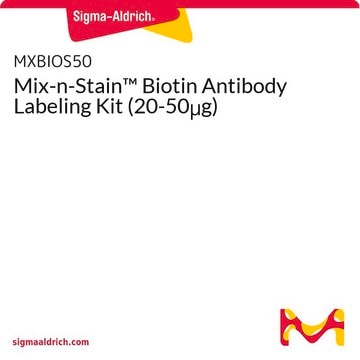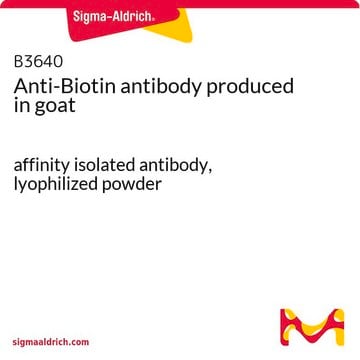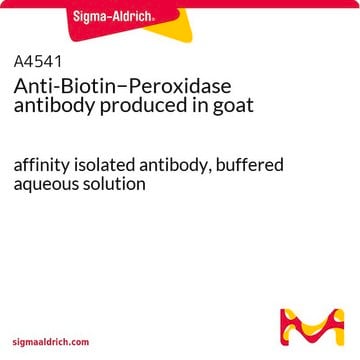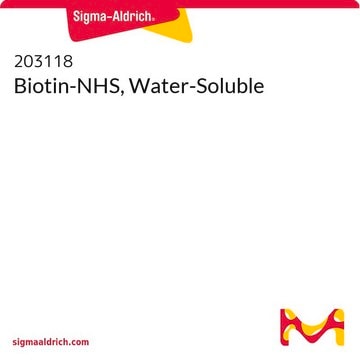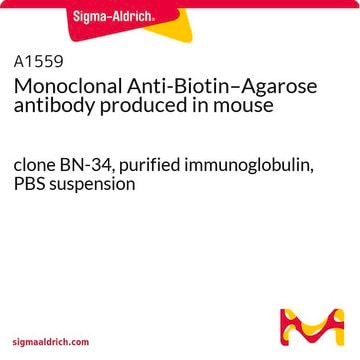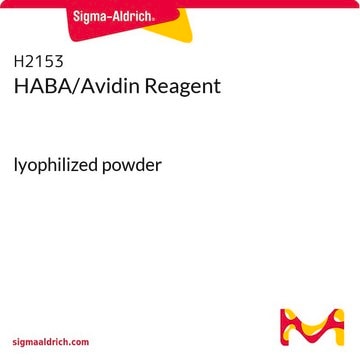BTAG
BiotinTag™ Micro Biotinylation Kit
Sinónimos:
Biotinylation Kits
Iniciar sesiónpara Ver la Fijación de precios por contrato y de la organización
About This Item
UNSPSC Code:
12352200
NACRES:
NA.32
Productos recomendados
technique(s)
bioconjugation: suitable
storage temp.
2-8°C
¿Está buscando productos similares? Visita Guía de comparación de productos
General description
For custom biotinylation of proteins, Sigma offers kits for conjugation on two different scales. The biotin-avidin system has become popular when high sensitivity and specificity are desired. Biotin can be conjugated to antibodies, lectins, enzymes, and other proteins. The protocols in the kits have been optimized for antibodies. Avidin binds to biotin with a high affinity (Ka = 1015 M) and specificity. When conjugated to enzymes or fluorochromes avidin provides a means of identifying biotinylated compounds via enzymatic conversion of substrate to form a visible product or detection of fluorescence by spectrophotometry or flow cytometry.
Application
BiotinTag™ Micro Biotinylation Kit has been used to generate biotylanted IgG2a antibody conjugate and in the biotinylation of interleukin 9 receptor α (IL-9Rα) and thymic stromal lymphopoietin α (TSLPRα).
Biotin has been modified with aminocaproate, then activated via an ester linkage with sulfo-N-hydroxysuccinimide (BAC-Sulfo-NHS). Aminocaproate provides a six-carbon spacer that reduces steric hindrance on the biotin and improves accessibility to the binding site on avidin. Sulfonation of the hydroxysuccinimide increases the polarity of the reagent, allowing it to dissolve easily in aqueous buffer. The ester provides a carbonyl carbon adjacent to a labile ester linkage as a target for primary amine side chains of accessible lysine residues, joining the biotinamidocaproate to the protein via an amide bond.
Features and Benefits
- Complete protocols for labeling and assay
- BAC-Sulfo-NHS is completely water soluble
- No DMF or DMSO needed
- Biotinylation occurs near neutral pH and physiological ionic strength, avoiding harsh conditions that could damage sensitive proteins
- Fast separation of conjugate from reactants using gel filtration
- 2-5 molar ratio biotin to protein in conjugate (for antibodies)
1 mg protein per reaction (B-TAG)
10 mg protein per reaction (BK-101)
• Sufficient reagents for at least 5 labelings
Analysis Note
Procedure:
Conjugation is performed in four easy steps:
1. Reconstitute BAC-Sulfo-NHS with Phosphate Buffer (PB).
2. Add BAC-Sulfo-NHS to protein and allow to react for 30 minutes at room temperature.
3. Separate the conjugate from the reactants on gel filtration.
4. Assay the conjugate for biotin incorporation by the avidin-HABA assay (BK-101 only). Conjugate is ready to use.
Conjugation is performed in four easy steps:
1. Reconstitute BAC-Sulfo-NHS with Phosphate Buffer (PB).
2. Add BAC-Sulfo-NHS to protein and allow to react for 30 minutes at room temperature.
3. Separate the conjugate from the reactants on gel filtration.
4. Assay the conjugate for biotin incorporation by the avidin-HABA assay (BK-101 only). Conjugate is ready to use.
Legal Information
BiotinTag is a trademark of Sigma-Aldrich Co. LLC
signalword
Warning
hcodes
Hazard Classifications
Skin Sens. 1
Storage Class
12 - Non Combustible Liquids
flash_point_f
Not applicable
flash_point_c
Not applicable
Certificados de análisis (COA)
Busque Certificados de análisis (COA) introduciendo el número de lote del producto. Los números de lote se encuentran en la etiqueta del producto después de las palabras «Lot» o «Batch»
¿Ya tiene este producto?
Encuentre la documentación para los productos que ha comprado recientemente en la Biblioteca de documentos.
Los clientes también vieron
Quantum dot enabled lateral flow immunoassay for detection of cardiac biomarker NT-proBNP
Wilkins MD, et al.
Sensing and Bio-Sensing Research, 21, 46-53 (2018)
Ming Yang et al.
Viruses, 14(4) (2022-04-24)
Foot-and-mouth disease virus (FMDV) causes FMD, a highly contagious disease of cloven-hoofed animals including cattle, goats, pigs and sheep. Rapid detection of FMDV is critical to limit the devastating economic losses due to FMD. Current laboratory methods for FMDV detection
IL-2,-7, and-15, but not thymic stromal lymphopoeitin, redundantly govern CD4+ Foxp3+ regulatory T cell development
Vang KB, et al.
Journal of Immunology, 181(5), 3285-3290 (2008)
Carole L Browne et al.
The Journal of experimental biology, 210(Pt 7), 1275-1287 (2007-03-21)
Numerous reports document that the 70 kDa heat shock proteins are not only intracellular proteins but are also present in blood and other extracellular compartments. How they affect cell function from the extracellular space remains unclear. Using two well-characterized cell
Nuestro equipo de científicos tiene experiencia en todas las áreas de investigación: Ciencias de la vida, Ciencia de los materiales, Síntesis química, Cromatografía, Analítica y muchas otras.
Póngase en contacto con el Servicio técnico


